
6 minute read
Emerald Keepers Advocates
SUSTAINABLE SOLUTIONS
Emerald Keepers engaging community for a greener Coronado
Advertisement
Underwater shots of a seahorse and pregnant stingray captured by photographer Neal Matthews in Glorietta Bay.
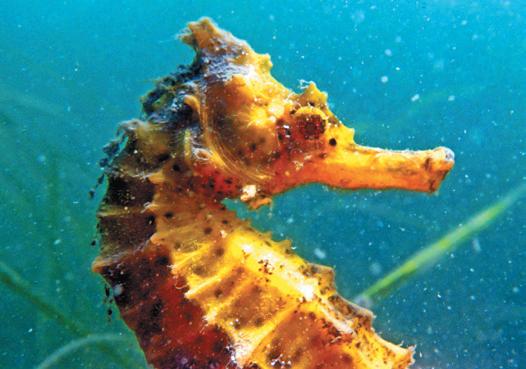
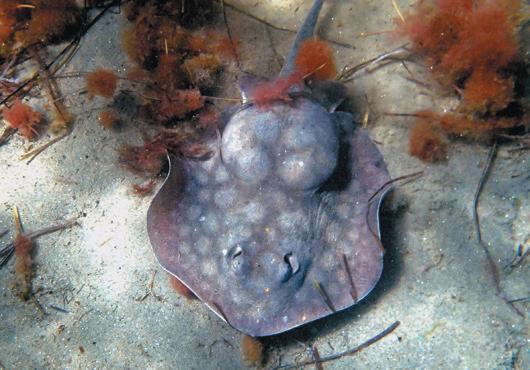
very minute of every day, the equivalent of one large truckload of plastic is dumped into the oceans, adding up to 8 million metric tons a year. That’s the weight of nearly 90 aircraft carriers.
Amy Steward, president of the nonprofit Emerald Keepers, wants Coronado to help reduce that staggering number, one plastic grocery bag, water bottle and takeout container at a time.
The retired Coronado teacher founded Emerald Keepers in June 2019 with Libby Troyer, the organization’s vice president, and Lisa Thompson, one of Emerald Keepers’ team members. The idea behind Emerald Keepers is simple: make residents more aware of the E
By MARTINA SCHIMITSCHEK
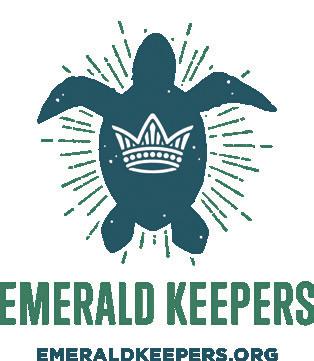
environment and have everyone pitch in for a cleaner Coronado and its surrounding waters.
“We really want to educate Coronado. People really don’t know what they can do,” Steward said.
With the motto of reduce, reuse, recycle, refuse, Emerald Keepers is on a mission to have residents take a pledge to be more sustainable by eliminating single-use plastics, drive less and pick up three pieces of trash every day. So far, 360 have made the commitment.
Emerald Keepers is also working with the city and local businesses. Restaurants have to meet a number of criteria to become an Emerald Keeper, including eliminating polystyrene, plastic straws, plastic bags and plastic utensils for dine-in customers. (Take-out utensils can be provided upon request.) Other businesses need to phase in energy-efficient appliances and LED lighting, as well as eliminate plastic water bottles on site and provide only paper bags on request. To date, 29 business and restaurants
Volunteers celebrate a beach cleanup that was cosponsored by Emerald Keepers and the Rotary Club of Coronado.
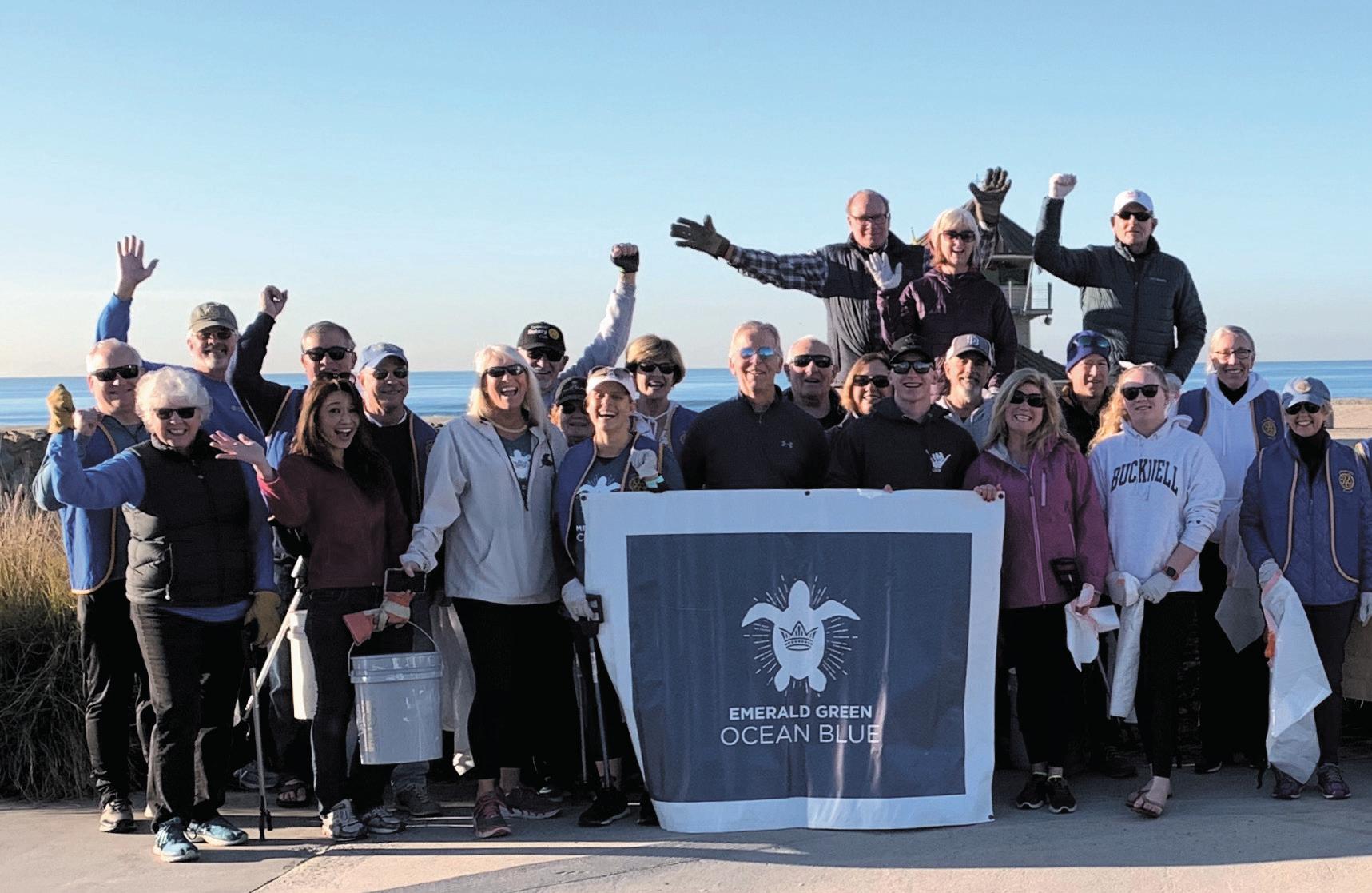
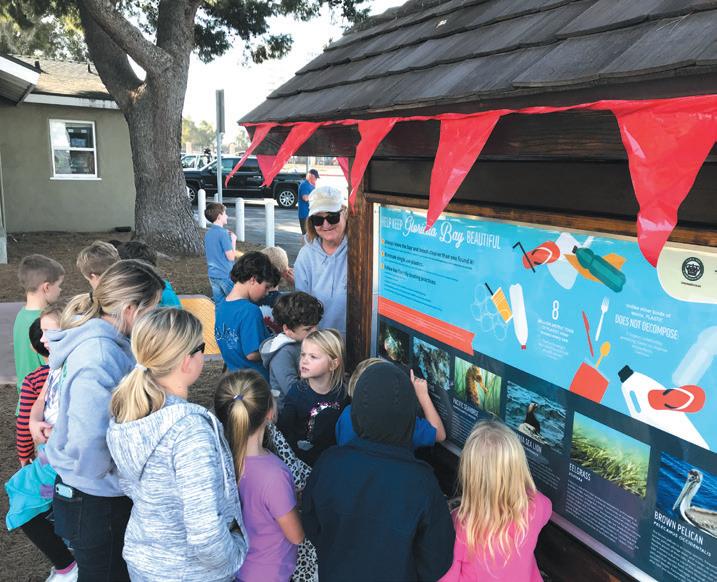
have signed up.
“Little shifts are making a huge difference in Coronado,” Steward said.
To help get the word out, Emerald Keepers has partnered with the Coronado Public Library for “Vision 2020.” Among the events is a series of programs educating the public on everything from environmental stewardship of the Navy and pollution on the U.S.-Mexican border to the Great Pacific Garbage Patch and the chemical breakdown of plastics.
The partnership has also nudged the library toward more sustainable practices.
“If you have been to an event at the library recently, you will have noticed that we are using crockery and no longer using paper/plastic cups,” said Shaun Briley, the
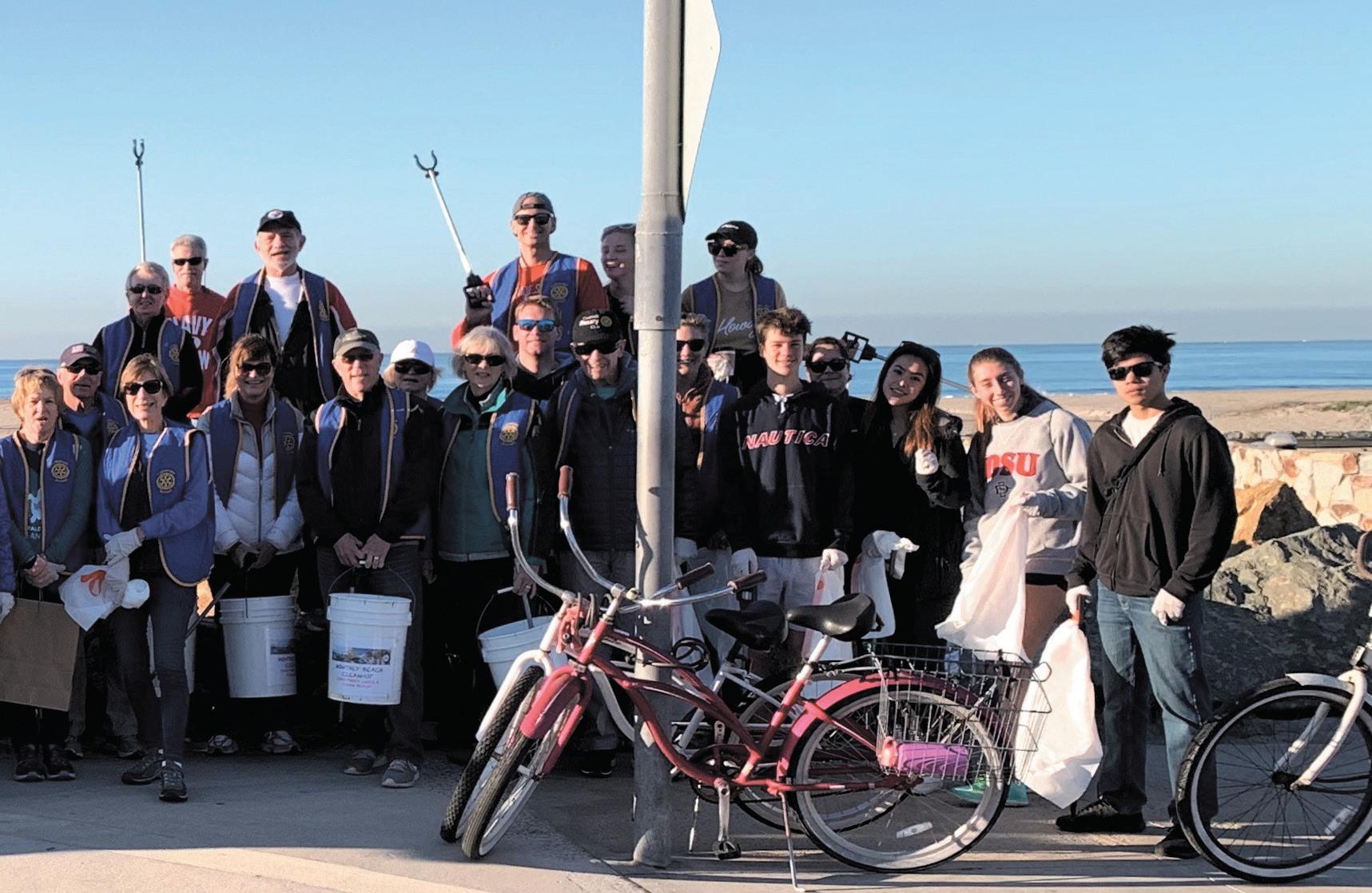
library’s director. “Since the library is arguably the busiest public venue in the city, this is hopefully having an impact. I have a request in with the public works department to convert our drinking fountains to be able to refill multi-use bottles. We made these changes to try to live up to the challenge thrown down by Emerald Keepers.”
The partnership has also included a poster contest for kids and a citizen science expo. Still on the agenda are a group read of The Death and Life of Monterey Bay, by Stephen Palumbi and Carolyn Sotka, and Earth Day activities on April 22 that include the screening of A Plastic Ocean and a community trash cleanup.
It was the amount of trash on the beach and along the bay during a cleanup that sparked the three
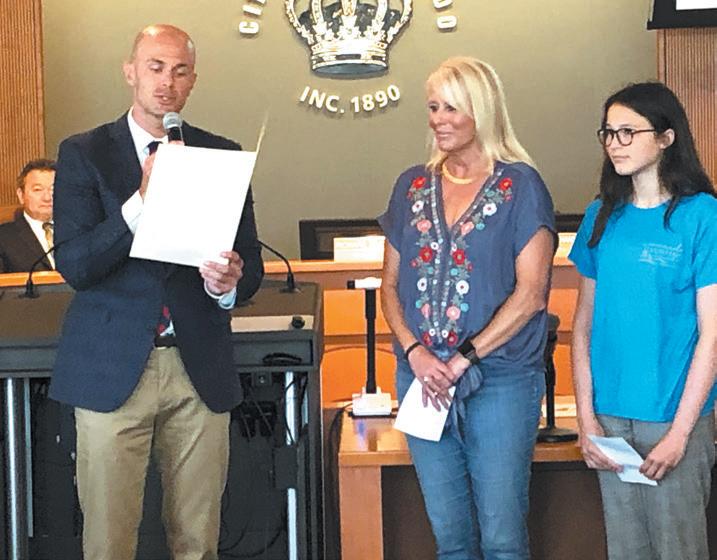
Mayor Richard Bailey proclaims June 2019 "Emerald Green, Ocean Blue" month as Emerald Keepers president Amy Steward and high school board member Jesse Hill look on.
BY THE NUMBERS
8 million Metric tons of plastic enter the ocean annually.
80 Percent of marine litter stemming from land-based sources.
46,000 Pieces of floating microplastic in every square mile of ocean, estimated in 2006 by the United Nations Environment Programme.
5Number of gyres, a circular oceanic current, in the world. The North Pacific Gyre contains the Great Pacific Garbage Patch where waste from North America and Japan are drawn together. Its size has been estimated to equal Texas.
8.4 Percent of plastic recycled in the United States in 2017, down from 2016. Some estimate plastic recycling dipped to less than 5% in 2019.
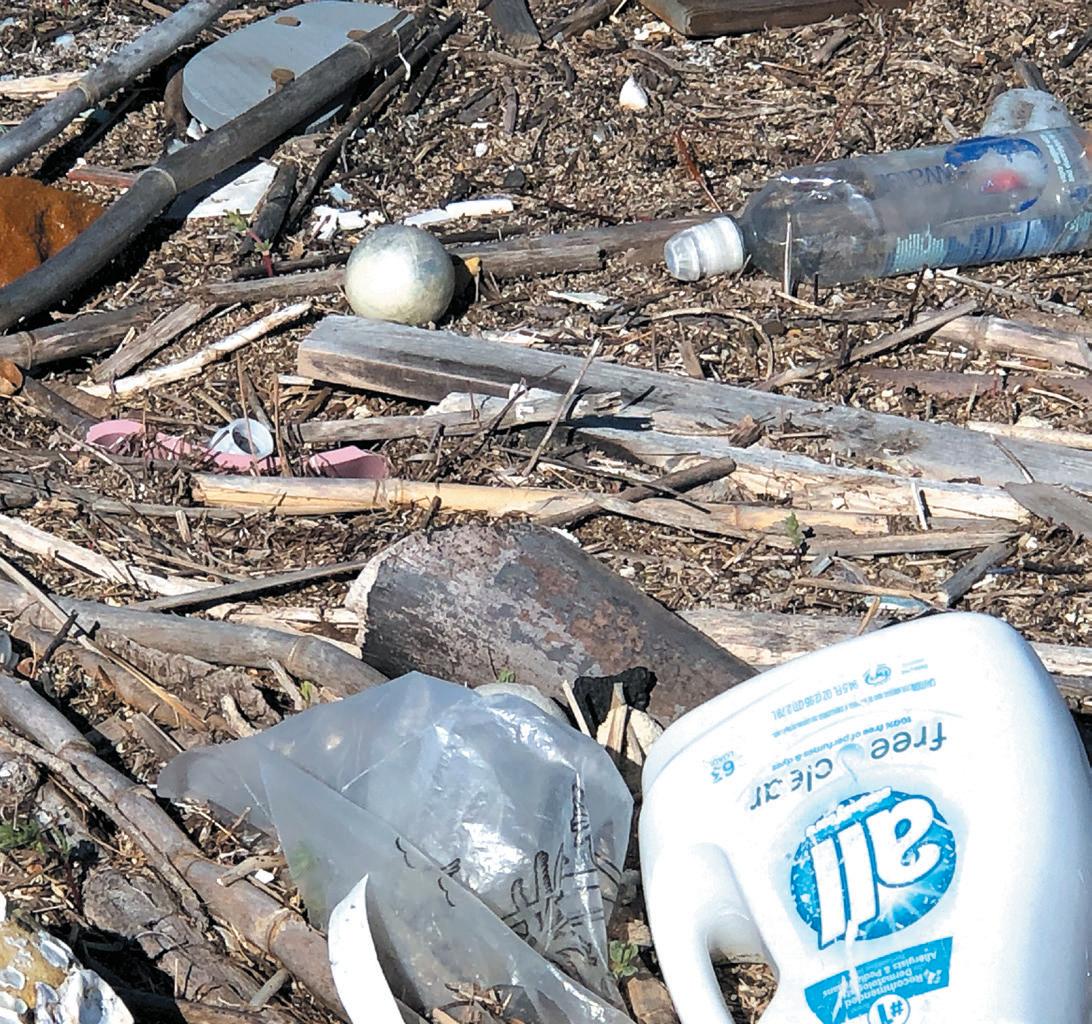
1,200 Number of species endangered by plastic ingestion or entanglement
500 Approximate number of marine dead zones, covering about 95,000 square miles. Dead zones are depleted of oxygen necessary to support marine life. 2100 When all World Heritage coral reefs could be destroyed due to pollution and warming waters, according to UNESCO.
into action. Because Coronado is surrounded by water, the shoreline waste ends up in the ocean and bay. “If you walk on our beaches, you see so much trash, especially plastic. It’s just horrific,” Steward said. “We call ourselves the emerald isle, the emerald city, but we are not very green.”
As president of the organization, Steward is dedicated to change that. After 24 years as a local educator, Steward is connected to the community and is also reaching out to schools to help the cause. Coronado High School now has an Emerald Keepers Club that is helping with events for younger students and in the community. She has also been advocating for using both sides of paper in classrooms and using repurposed items for art.
“It’s important to involve students. They are going to have to live with the mess we’ve created,” she said. Along with a full schedule of events, the organization has also created a sign in partnership with the city of Coronado at the entrance to Glorietta Bay Park with photographs of the bay’s wildlife, facts about plastic and ways to become an Emerald Keeper. Steward is currently working on placing buckets along the beaches for people to borrow and collect trash as well as creating homefront signs for those who take the
Emerald Keepers pledge. The signs will be made from reclaimed wood burnished with the organization’s turtle logo.
Besides taking the Emerald Keepers pledge, the organization’s website offers 50 things residents can do to be “emerald green, ocean blue.” Some items are as easy as carrying a reusable grocery bag and water bottle or reading the newspaper online.
“We are a throwaway culture but we don’t need to be a throw- away culture,” Steward said. “We need to change the way we pack- age in the United States.”
Steward’s ultimate goal is to make Coronado a sustainable city with no single-use plastics. She already has many people thinking about being greener.
“You might have noticed that library summer reading programs throughout the country famous- ly have cheap, giveaway – and throwaway – plastic ‘incentives’ like pens, pendants and toys (the library equivalent of the Happy Meal toy) intended to incentivize kids to sign up for the reading pro- gram and reward them for reading over the summer,” Briley said. “I have committed to being the first li- brary that we know of to have 100 percent sustainable, recyclable and environmentally friendly reading incentives for kids. Don’t honestly know yet how we are going to do it. But I am on it!”
Everyone doing a little can add up to a lot, Steward said.
“I would ultimately love for oth- er communities to do this as well,” she said. “If we can get Coronado to do it, then others, too, can do what we are doing to be green.”

















